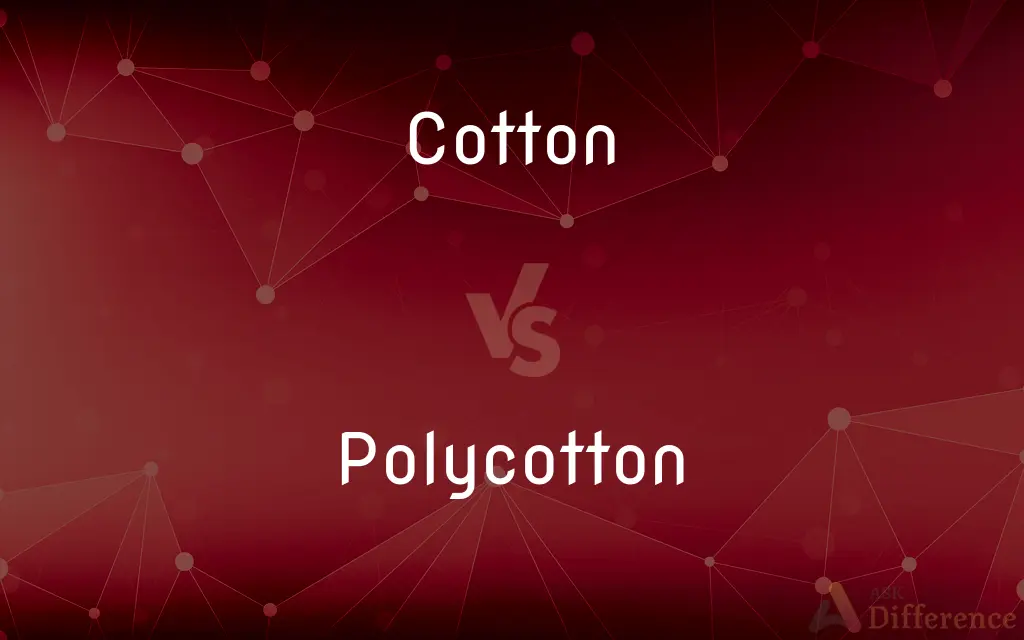Cotton vs. Polycotton — What's the Difference?
By Urooj Arif & Fiza Rafique — Updated on May 15, 2024
Cotton is a natural fiber known for its breathability and softness, whereas polycotton, a blend of polyester and cotton, offers enhanced durability and wrinkle resistance.

Difference Between Cotton and Polycotton
Table of Contents
ADVERTISEMENT
Key Differences
Cotton is prized for its natural origin, made from the fluffy fibers of the cotton plant, offering exceptional comfort and breathability. In contrast, polycotton combines the qualities of polyester with cotton to achieve greater durability and less susceptibility to shrinking.
When it comes to care and maintenance, cotton may require more attentive care, including potential shrinkage and wrinkles. Polycotton, on the other hand, is easier to care for, resisting wrinkles and maintaining its shape after washing.
In terms of thermal properties, cotton is highly breathable, making it ideal for warm climates and summer wear. Polycotton, while still relatively breathable, tends to retain more heat due to the presence of polyester, making it less ideal in very hot conditions.
The texture of cotton is often softer and more comfortable against the skin, which is especially noticeable in garments like underwear and bedsheets. Polycotton, however, may feel slightly rougher or less natural but is often more robust for frequent use.
Cost-effectiveness is another consideration; pure cotton tends to be more expensive due to its natural origins and manufacturing process. Polycotton is generally cheaper to produce and thus more affordable, offering a budget-friendly alternative without drastically compromising quality.
ADVERTISEMENT
Comparison Chart
Origin
Natural fiber from cotton plant
Blend of synthetic polyester and natural cotton
Breathability
High
Moderate
Care
Prone to shrinkage and wrinkles
Wrinkle-resistant, less shrinkage
Comfort
Softer, more comfortable
Less soft, slightly rougher
Cost
Generally more expensive
More affordable
Compare with Definitions
Cotton
A natural textile fiber obtained from the cotton plant.
The cotton sheets felt incredibly soft and luxurious.
Polycotton
A fabric made by blending polyester and cotton fibers.
His polycotton shirt is durable and stays wrinkle-free.
Cotton
Cotton is a soft, fluffy staple fiber that grows in a boll, or protective case, around the seeds of the cotton plants of the genus Gossypium in the mallow family Malvaceae. The fiber is almost pure cellulose.
Polycotton
Less expensive than pure cotton and widely used in various textiles.
Polycotton is often used in budget hotels for linens and drapes.
Cotton
Any of various shrubby plants of the genus Gossypium, having showy flowers and grown for the soft white downy fibers surrounding oil-rich seeds.
Polycotton
Not as breathable as cotton but more resistant to environmental wear and tear.
For outdoor cushions, polycotton is preferred for its resistance to the elements.
Cotton
The fiber of any of these plants, used in making textiles and other products.
Polycotton
Known for its durability and ease of maintenance.
Polycotton uniforms are ideal for frequent wear due to their durability.
Cotton
Thread or cloth manufactured from the fiber of these plants.
Polycotton
Combines the comfort of cotton with the resilience of polyester.
Polycotton bed linens offer comfort and are easy to maintain.
Cotton
Any of various soft downy substances produced by other plants, as on the seeds of a cottonwood.
Polycotton
A fabric made from a blend of cotton and artificial fibres, especially of polyester fibres
Cotton
To take a liking; attempt to be friendly
A dog that didn't cotton to strangers.
An administration that will cotton up to the most repressive of regimes.
Cotton
To come to understand. Often used with to or onto
"The German bosses ... never cottoned to such changes" (N.R. Kleinfield).
Cotton
Gossypium, a genus of plant used as a source of cotton fiber.
Cotton
Any plant that encases its seed in a thin fiber that is harvested and used as a fabric or cloth.
Cotton
Any fiber similar in appearance and use to Gossypium fiber.
Cotton
(textiles) The textile made from the fiber harvested from a cotton plant, especially Gossypium.
Cotton
(countable) An item of clothing made from cotton.
Cotton
Made of cotton.
Cotton
(transitive) To provide with cotton.
Cotton
To supply with a cotton wick.
Cotton
To fill with a wad of cotton.
Cotton
(horticulture) To wrap with a protective layer of cotton fabric.
Cotton
To cover walls with fabric.
Cotton
(tar and cotton) To cover with cotton bolls over a layer of tar (analogous to tar and feather )
Cotton
To make or become cotton-like
Cotton
To raise a nap, providing with a soft, cottony texture.
Cotton
To develop a porous, cottony texture.
Cotton
To give the appearance of being dotted with cotton balls.
Cotton
To enshroud with a layer of whiteness.
Cotton
To protect from harsh stimuli, coddle, or muffle.
Cotton
To rub or burnish with cotton.
Cotton
To get on with someone or something; to have a good relationship with someone.
Cotton
A soft, downy substance, resembling fine wool, consisting of the unicellular twisted hairs which grow on the seeds of the cotton plant. Long-staple cotton has a fiber sometimes almost two inches long; short-staple, from two thirds of an inch to an inch and a half.
Cotton
The cotton plant. See Cotten plant, below.
Cotton
Cloth made of cotton.
Cotton
To rise with a regular nap, as cloth does.
It cottons well; it can not choose but bearA pretty nap.
Cotton
To go on prosperously; to succeed.
New, Hephestion, does not this matter cotton as I would?
Cotton
To unite; to agree; to make friends; - usually followed by with.
A quarrel will end in one of you being turned off, in which case it will not be easy to cotton with another.
Didst see, Frank, how the old goldsmith cottoned in with his beggarly companion?
Cotton
To take a liking to; to stick to one as cotton; - used with to.
Cotton
Silky fibers from cotton plants in their raw state
Cotton
Fabric woven from cotton fibers
Cotton
Erect bushy mallow plant or small tree bearing bolls containing seeds with many long hairy fibers
Cotton
Thread made of cotton fibers
Cotton
Take a liking to;
Cotton to something
Cotton
Used primarily for clothing, it is appreciated for its softness and breathability.
She prefers cotton dresses in the summer for their breathability.
Cotton
It is biodegradable and considered environmentally friendly.
Many eco-conscious consumers choose cotton because it is biodegradable.
Cotton
Requires more water and care to grow compared to synthetic fibers.
Growing cotton is water-intensive, requiring a lot of irrigation.
Cotton
Often preferred for its hypoallergenic properties.
For those with sensitive skin, cotton apparel is recommended due to its hypoallergenic nature.
Common Curiosities
Is cotton or polycotton better for summer clothing?
Cotton is generally better for summer clothing due to its higher breathability and ability to keep the body cool.
Can cotton be eco-friendly?
Yes, cotton is biodegradable and renewable, but it requires significant water and pesticides, which can be environmentally challenging.
What is cotton primarily used for?
Cotton is primarily used for clothing, towels, bed linens, and upholstery due to its softness and breathability.
What are the main benefits of polycotton?
Polycotton offers durability, wrinkle resistance, and ease of maintenance, making it suitable for work clothes and everyday wear.
Why might someone choose polycotton over cotton?
Someone might choose polycotton for its affordability, durability, and lower maintenance compared to cotton.
Can cotton fabrics handle heavy wear and frequent washing?
Cotton can handle heavy wear, but frequent washing may lead to shrinkage and faster wear-out compared to more durable fabrics like polycotton.
What is the lifespan of cotton products compared to polycotton products?
Polycotton products generally have a longer lifespan than cotton due to polyester's strength, which adds durability and reduces wear over time.
How does the production impact of cotton compare to polycotton?
Cotton's production is more water and pesticide-intensive, making it less environmentally friendly compared to polycotton, which, while synthetic, utilizes less water and chemicals during manufacturing.
Is polycotton suitable for sensitive skin?
Polycotton may not be as suitable for sensitive skin as cotton because the synthetic fibers in polycotton can be less breathable and potentially irritating.
What are the advantages of cotton in bedding materials?
Cotton bedding offers superior comfort, softness, and breathability, making it ideal for a comfortable sleep environment, especially in warm weather.
Share Your Discovery

Previous Comparison
Sulk vs. Pout
Next Comparison
Hustle vs. HassleAuthor Spotlight
Written by
Urooj ArifUrooj is a skilled content writer at Ask Difference, known for her exceptional ability to simplify complex topics into engaging and informative content. With a passion for research and a flair for clear, concise writing, she consistently delivers articles that resonate with our diverse audience.
Co-written by
Fiza RafiqueFiza Rafique is a skilled content writer at AskDifference.com, where she meticulously refines and enhances written pieces. Drawing from her vast editorial expertise, Fiza ensures clarity, accuracy, and precision in every article. Passionate about language, she continually seeks to elevate the quality of content for readers worldwide.











































